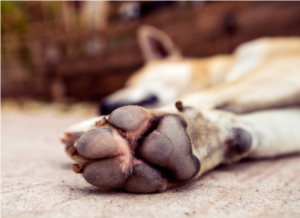This is where a beautiful relationship begins: the animal relies on you, and in many cases you rely on the animal, too. You become each other’s companion. You devote your time to each other.
And maybe that’s the reason why we are starting to understand that the end of a relationship with a companion animal is just as full of grief and of sadness as the end of a relationship with a fellow human being. We become attached to our companion animals, and they become attached to us, and this is normally a good thing, except that we tend to outlive them. As a consequence, we humans must deal with the absence and the loss that follows when our animal friends pass away.

In 2012, Joe Yonan, the Food and Dining editor at the Washington Post, published a story about the sudden death of his Doberman, Red. He wrote about the grief that he felt at his father’s death, and at his sister’s — and about how the grief that he felt over Red’s death seemed to be similar, except that Red was a dog and not a human being. He asked, “How could the death of a canine possibly hurt as much as that of a family member?”
Others have gone on to ask the exact same question, including, most recently, Alvin Chang on Vox.com: Why do some of us feel exactly the same grief when a companion animal dies, as when a human dies?
According to the American Veterinary Medical Association, the bond between humans and animals is both dynamic and mutually beneficial. This relationship is shaped by actions and behavior that are necessary for health, well-being, and survival. While dogs are used as the major model in terms of better understanding this bond, we know that humans form bonds with other animals, including but not limited to cats, horses, birds, snakes, and more.
What is this bond all about? What goes into it and what do we get out of it? What do our animal friends get out of it? There are theories and ongoing research and inquiries aplenty, and even an entire scientific discipline, called anthrozoology, that is directly concerned with the relationships that are formed between humans and animals.
But when we get down to the basics, and to the everyday life of living side-by-side with a companion animal, both Yonan and Chang emphasize the idea of becoming attached to a dog, and how that attachment helped them to survive.
Companion animals give their humans affection and, in many cases, loyal and unconditional love. They provide an ear that will listen at the end of a long day, and emotional support during times of crisis — and, unlike other humans, these animals neither pass judgment nor offer unsolicited advice. They almost always forgive us even when we neglect them, and they accept us no matter what we look like or feel like.
In return, the responsibilities attached to having a companion animal seem to give many humans motivation to take care of themselves, even as they’re taking care of those companion animals. If you’ve heard of the book “A Street Cat Named Bob,” or its upcoming movie adaptation, that’s exactly what happened. The writer of the book, James Bowen, saved a wounded street cat — and saved himself from drugs and homelessness in the process.
Many other people have found their lives to be changed in large and small ways just because of the presence of a companion animal. There are even countless studies that list the many ways in which having a companion animal has been found to be good for the health and well-being of the human. So it’s no surprise experts are now paying more attention to what happens, and how we react, when our companion animals die.
One of the keys to understanding the grief that follows the death of a companion animal is accepting that this grief is just as valid as the grief that follows the death of a loved one.
Another is that the process of grieving is a personal experience, and is different for each person going through the process.
It is becoming easier to perform death-related rituals for companion animals who have died. Many people choose to cremate their animal friends and then scatter the ashes at a place that is special to them and to their companion animals, or to bury those ashes in pet cemeteries. In the Philippines, various veterinary clinics, and a few companies who provide memorial and funeral services, are now offering cremation and interment for departed companion animals.
SOURCES:
https://en.wikipedia.org/wiki/James_ Bowen_(author) https://www.avma.org/kb/resources/ reference/human-animal-bond/pages/ human-animal-bond-avma.aspx http://www.griefhealing.com/articlewhy-does-pet-loss-hurt-so-much.htm http://www.helpguide.org/articles/ grief-loss/coping-with-pet-loss.htm http://www.vox. com/2016/7/11/12109786/dogdeath-research http://www.utne.com/mind-andbody/importance-of-humananimal-bond-ze0z1406zhou. aspx?pageid=1#PageContent1 https://www.washingtonpost.com/ national/health-science/the-death-ofpet-can-hurt-as-much-as-the-loss-ofa-relative/2012/02/21/gIQALXTXcS_ story.html
This story appeared in Animal Scene’s November 2016 issue.






